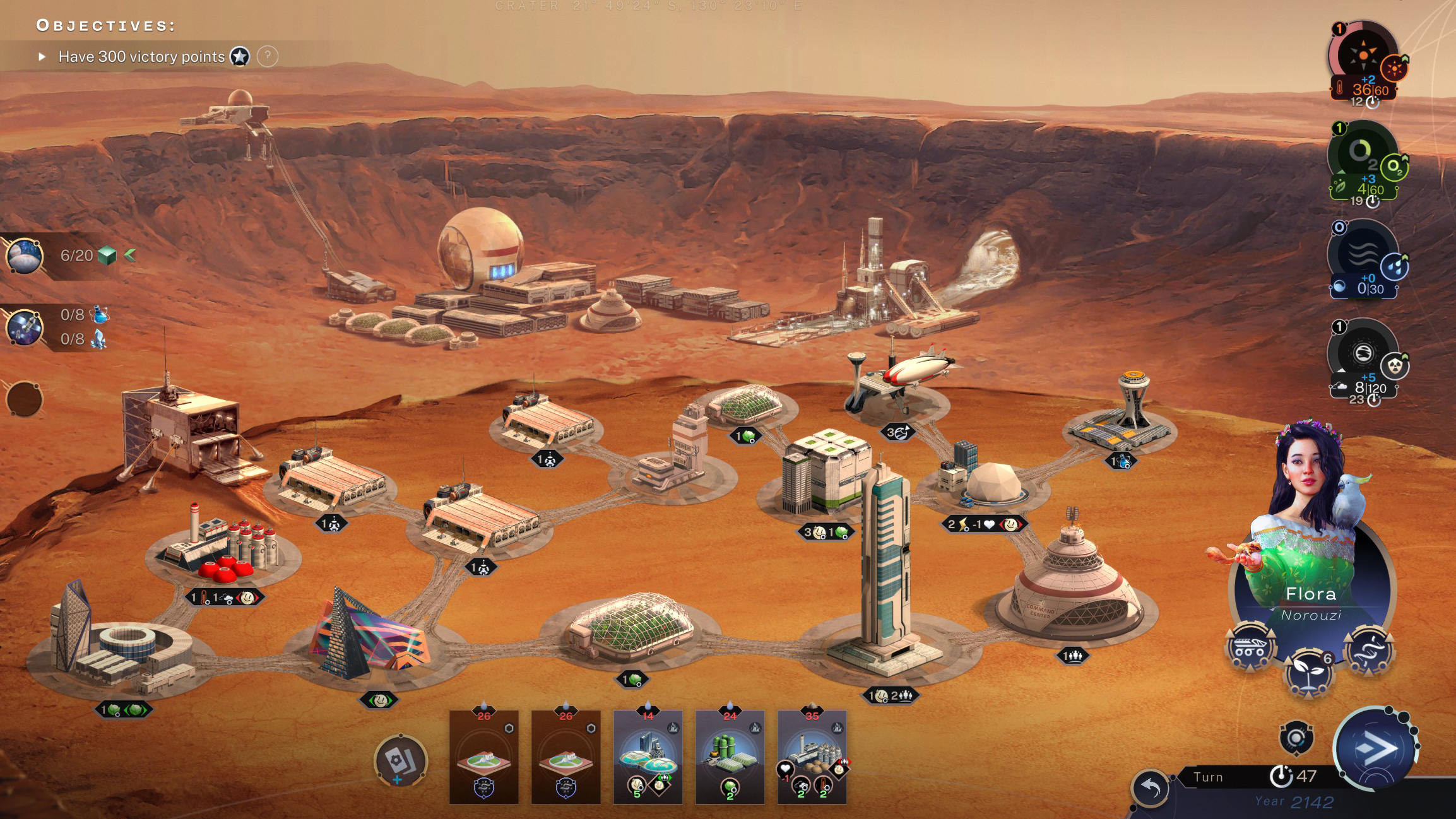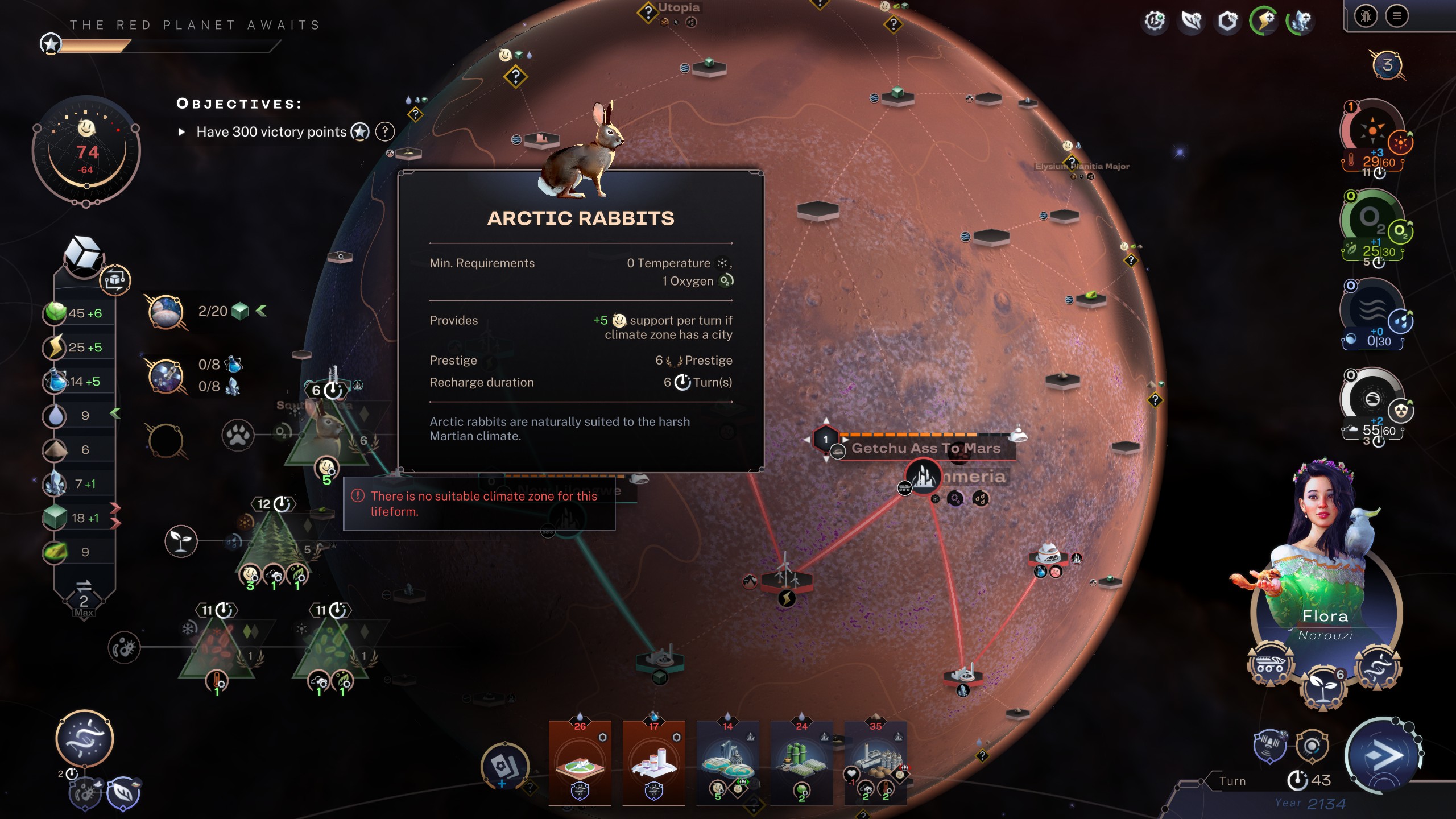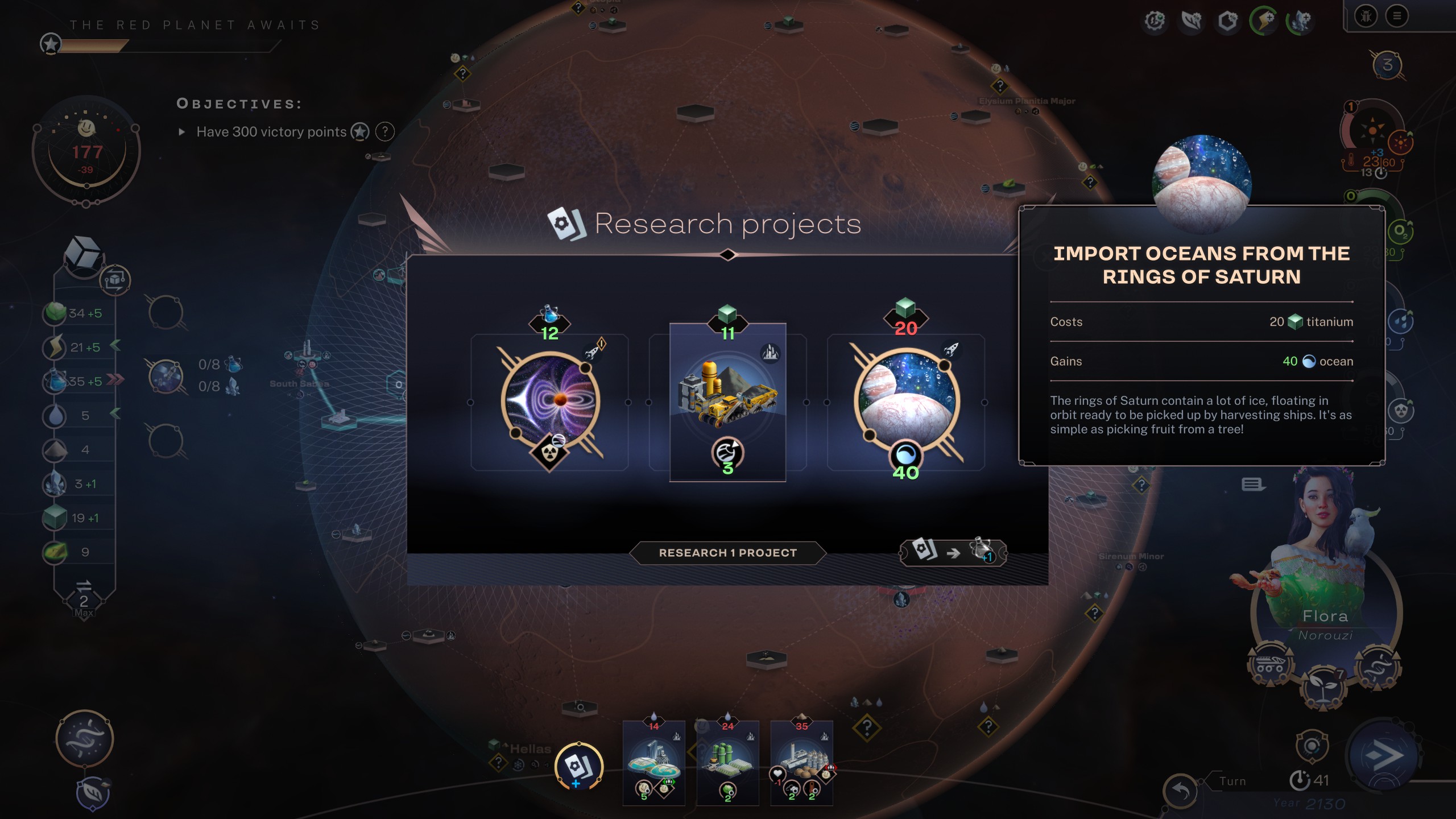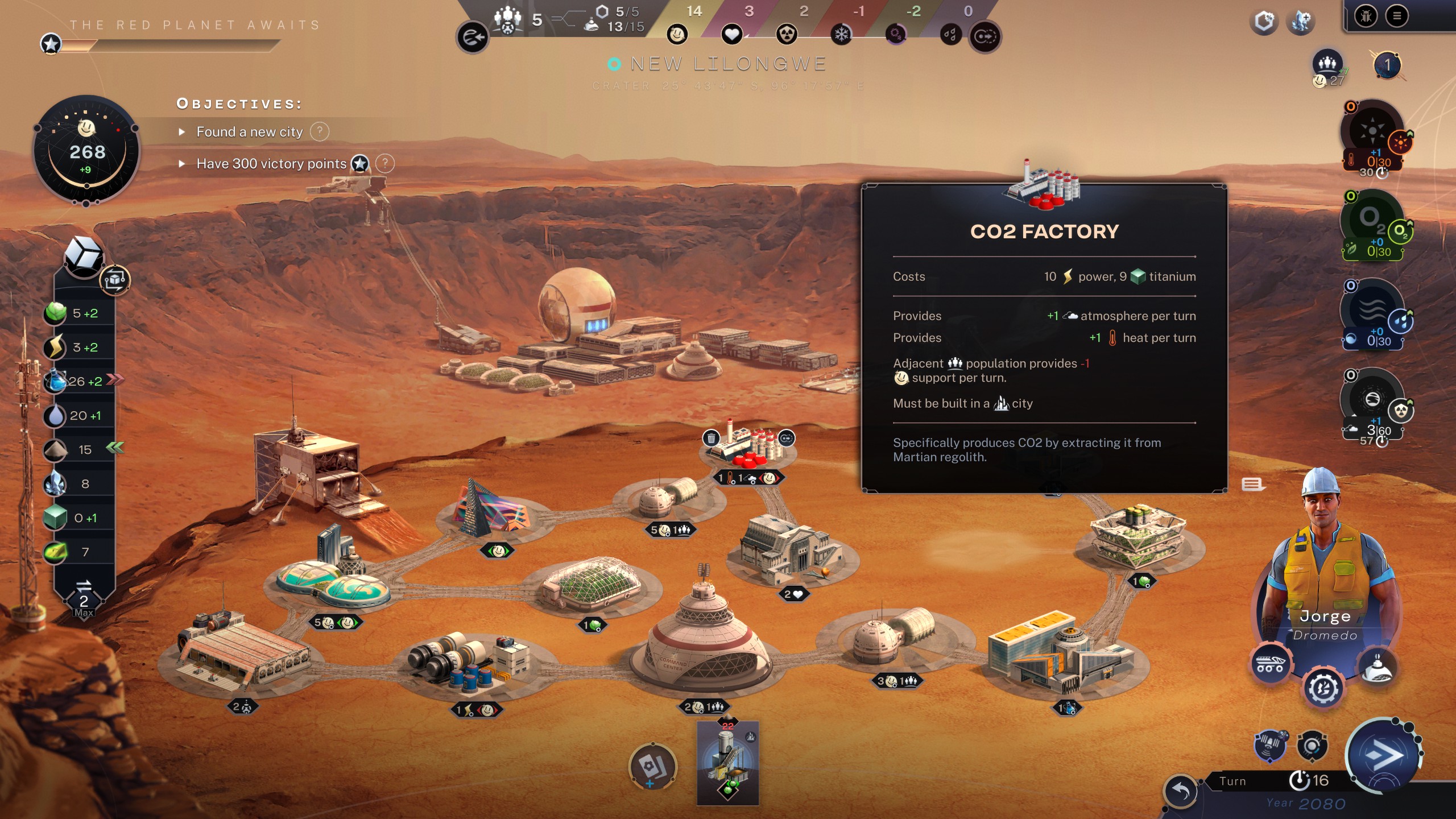Why I failed to terraform Mars: too many space hotels, not enough cabbage
Strategy colony-builder Terraformers puts you in charge of turning Mars from a red planet to a green one.

I'm in charge of terraforming Mars for human colonization, and as I gaze out over the small cluster of habitats, greenhouses, wind farms, and factories on the barren surface of the Red Planet, I mutter to myself: "Dammit, I need more green space cubes."
This is just one of the many, many signs that I probably shouldn't be in charge of Mars in Terraformers, the strategy colony-builder that just entered Steam Early Access. A real leader would use the proper term for the resource they needed—titanium—rather than calling it "green space cubes" simply because that's what the icon looks like. I also call nitrates "sand" and tritium "glowy stuff" and food "cabbages" because that's what their icons look like to me. Presumably, my colonists are not subsisting on a diet of only cabbages. They'd probably have revolted by now.
They'll revolt later, don't worry.
There's a bit of a Civ feel to parts of Terraformers: You begin by picking a leader with various skills, like an AI expert who gives you a bonus to researching new tech and placing extra drone stations, or a botanist who can boost your ability to research and develop lifeforms. You can even put a celebrity in charge, like the first person born on Mars, who gives a bonus to your "support" score which is basically citizen morale. Your leader won't stay in power for the entire terraforming effort: After their term in office is up, you'll choose a new one, meaning you can't rely on their special skills for all that long.

There's the sort of resource gathering systems you'd expect: explore more and more distant regions of Mars, collect what you find there, and use those resources to create new buildings. You build in a few different ways: by researching and placing buildings in a city, many which offer bonuses to each other when they're placed in proximity. You can also build resource mines, wind farms, and launch pads (so you can trade resources with Earth) on nodes on the larger Mars map. As you expand your exploration and grow your city you can create new cities, and start introducing terraforming equipment like CO2 factories and atmosphere generators. You can even, eventually, build stuff in orbit.
Who wouldn't want to swim in a Mars ocean made from Saturn water?
And that's my weakness. I'm a fan of the more wild sci-fi projects that come up in Terraformers because growing potatoes and building power plants and setting up nitrate silos, while certainly important to keeping my citizens alive, just don't have that much razzle-dazzle. I'm offered the chance to build space hotels—hotels, but in space—and so I drop everything and funnel all my green space cubes into that, because space hotels are cool. At least they sound cool. I do have to wonder, who is flying to Mars and then staying in a hotel in space? Wouldn't you want to stay on, y'know… Mars? It's taking a trip to Manhattan and then just staring at it from a window in a motel in Newark.
But my citizen's morale is boosted by the idea of hotel rooms in space, so I consider it worthwhile. Another fun project is offered to me: establish oceans on Mars by hauling ice all the way over from Saturn's rings. Hell, yeah! That sounds stupidly expensive and extremely unlikely, but who wouldn't want to swim in a Mars ocean made from Saturn water? I need way more space cubes to fund it, so I start selling Earth my spare cabbages and science water (technically scientific research points, but the icon looks like a beaker filled with liquid).
Keep up to date with the most important stories and the best deals, as picked by the PC Gamer team.

Along with far-fetched ideas, Terraformers is also filled with what feel like horrible, dangerous ideas. Like releasing bacteria on Mars. And I know bacteria is pretty important to life—there's apparently trillions of bacteria in my body right now and none of it has killed me, yet—but man, this is science fiction. Has anyone ever released a living organism in sci-fi without terrible consequences? I also research rabbits, with a goal of releasing them onto Mars once the climate is favorable enough. Because nothing ever went wrong with introducing rabbits to an environment with no natural predators, right? I guess they can't turn Mars into more of a wasteland.
Even just picking certain leaders seems like a terrible idea. One candidate is an industrialist from Earth who ran a coal mining empire and contributed heavily to global warming. And, yes, that is what we are trying to do on Mars, warm it up, so he does, technically, count as an expert. But it's hard to want to put him in charge of Mars since he helped ruin Earth—cuz that's why we really need to colonize Mars, right?

My Martian citizens think I suck because they don't have enough cabbages.
I wind up not picking him in favor of a robotics expert, because the morale of the humans on Mars is plummeting due to a lack of amenities you can afford when you spend time farming food and generating power, so I figure robots will be easier to keep happy. Unfortunately, it's to no avail. It's not my space hotels or clouds of bacteria that do me in. It's the morale problem. My Martian citizens think I suck because they don't have enough cabbages and the colonists start heading back to Earth. Not only am I booted from power, but the entire effort to colonize Mars is straight-up abandoned.
"You can't abandon Mars! What about the sunk cost fallacy?" I imagine myself screaming as I'm dragged out of my presidential office by the robots I had only recently constructed. "What about the sunk cost fallacy?"
If it's not clear, I did have a really nice time completely botching the terraforming of Mars. If you're a leader who can resist the allure of transporting ice cubes from Saturn in favor of actually trying to support your colonists, I'd recommend checking it out. For an Early Access game it feels pretty polished, with the exception of some UI clutter. There's even a free demo if you want to try before you buy.

Chris started playing PC games in the 1980s, started writing about them in the early 2000s, and (finally) started getting paid to write about them in the late 2000s. Following a few years as a regular freelancer, PC Gamer hired him in 2014, probably so he'd stop emailing them asking for more work. Chris has a love-hate relationship with survival games and an unhealthy fascination with the inner lives of NPCs. He's also a fan of offbeat simulation games, mods, and ignoring storylines in RPGs so he can make up his own.

